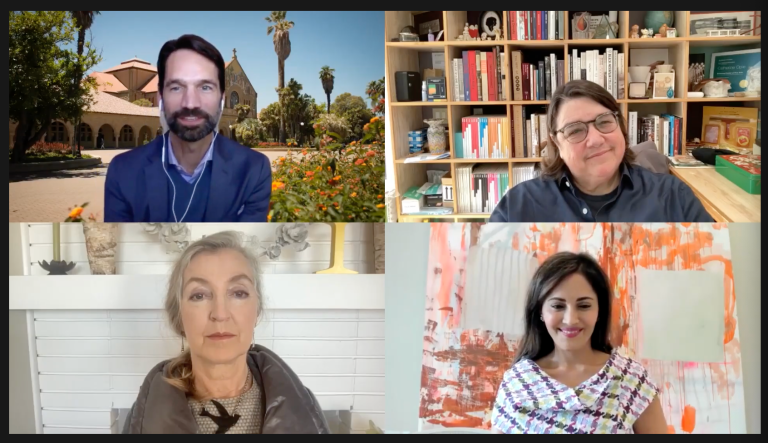“Stanford, I regret to tell you this,” said writer and activist Rebecca Solnit, “but Silicon Valley sprung from your very loins.”
And so began this Monday event, hosted by the Office of the Vice President for the Arts as part of the “Artists on the Future: The Komal Shah and Gaurav Garg Artist Conversation” series. The talk brought Solnit together with photographer Catherine Opie to discuss today’s most pressing problems and how to move towards a more equitable future through art. Opie is a 2019 Guggenheim fellow and chair of the art department at University of California, Los Angeles; Solnit has written more than 20 books and contributes to The Guardian.
Critiques of Silicon Valley made frequent appearances during the talk. Solnit described Silicon Valley as a “bad faith monster” implicated in a range of issues, from the genocide in Myanmar to the traumas exacerbated by social media to the colonization of other planets. Opie added that Silicon Valley is rife with “the constant spewing of utter lies” and that this environment of deceit created the “corrosive, corruptive minority” who fueled Donald Trump’s election victory. The speakers also touched on pressing issues of economic inequality, climate change and the American military-industrial complex.
Yet, even as the talk opened with a discussion of the present, Solnit and Opie soon found themselves looking back at their experiences as artist-activists in the 1980s to consider how younger generations might advocate for change.
Solnit and Opie both began their activism work during the ’80s and witnessed the period’s monumental political movements. Despite the popular understanding of the decade as being one defined by Reagan, for Solnit, the ’80s marked a significant cultural revolution of rethinking race, gender, sexuality and nature in America, as well as a transformation of the political left “into something that was less violent, more open and more inclusive.”
The era’s cultural climate compelled both speakers to ask social and artistic questions that drove their creativity. “What is documentary photography?” Opie recalled asking. “What is documentary?” These questions — still yet to be completely resolved in her mind — brought Opie clarity and afforded her a sharper precision and drive in her photography of American landscapes. When capturing mountains, oceans or even swamps, Opie sought to bear witness to the stories of the unseen individuals who often inhabit those spaces.
Solnit found her early years similarly defined by this challenge of learning to ask the right questions. “Artists taught me how to think,” Solnit said. “I found that they tend to ask truly foundational questions: what is the medium, what are the materials, who is the audience of this piece… Questions that go all the way down to the fundamentals.” For Solnit, this process of going back to the beginning, of assuming nothing and questioning everything, was incredibly formative during her undergraduate and graduate careers.
Solnit and Opie emphasized that asking the “right questions” could bring us closer to reality and reveal often-overlooked challenges.
“What saves us from becoming obedient subjects of authoritarianism, from being swept up in lies and being unable to determine what’s true or real for ourselves?” Solnit asked.
The proposed answer — to truly see, to truly hear our material spaces — seems simple enough, but its very simplicity is what makes it so hard to grasp, according to Solnit. Intense discipline is required to build precision into what are otherwise entirely instinctual acts, Solnit said. However, Solnit encouraged the audience to cultivate the habit of grounding ourselves in material reality.
“What do you see outside the window? Where do you stand? What are the indigenous histories of your land?” Solnit asked. “Notice the sensation of watching birds, holding babies, having meals with people, making food. These actions aren’t necessarily inherently political, but they help make the robust human being who can stand up against totalitarianism and trust the evidence of their own eyes and ears.”
To ask questions and to pay attention: as a response to the formidable question of approaching the future, this solution might appear too elementary, especially given Solnit and Opie’s recognition of how challenging the modern moment is. Yet, it is Solnit and Opie’s immense faith in the new generation that compels them to answer this way. Solnit and Opie trust that today’s young people have the strength to change things. For now, what’s left is to remind everyone of what’s elemental.
